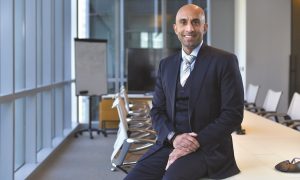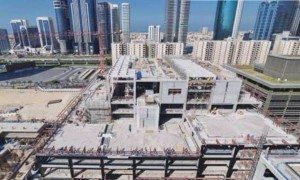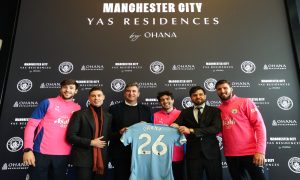Interview: Voltas finding the right conditions to thrive in the region
AR Suresh Kumar, head of the International Operations Business Group, Voltas, on why the Indian MEP giant will thrive in a challenging market

“With honest and straightforward business principles, close and careful attention to details, and the ability to take advantage of favourable opportunities and circumstances, there is a scope for success.”
These words come from a quote attributed to Jamsetji Tata, the man regarded as the ‘Father of Indian Industry’, and the founder of what would go on to become the Tata Group of Companies, one of India’s largest conglomerates, with a history going back more than 150 years.
Even in the year 2020, Tata’s words continue to ring true, and their echoes can be heard in the way the group’s subsidiaries operate and carry out business. Nowhere is this more evident than Voltas Limited, India’s largest air conditioning company and one of the most reputed engineering solution providers in the country, if not all of South-East Asia and the Middle East.
Created more than six decades ago when the Swiss-based Volkart Brothers joined forces with Tata Sons Limited, the company specialises in project management, and has played a vital role in developing India’s infrastructure, while also exporting its expertise across technology, engineering, construction, cooling and ventilation, infrastructure projects and many more sectors, to countries around the world.
As the COVID-19 pandemic continues to sweep across the world, Big Project ME caught up with AR Suresh Kumar, vice president and head of the International Operations Business Group for Voltas, to discuss how the company is adapting to the new normal, while continuing to thrive and grow its business despite the many challenges facing the industry, both regionally and internationally.
“We operate throughout the GCC, in UAE, Qatar, Oman, Bahrain and Saudi Arabia, while in the Far East, we have our operations in Singapore. We’re also licensed to operate in Hong Kong and Macau. Overall, if you look outside India, Voltas operates in almost 40 countries, and over the last 40 years, we’ve done a lot of jobs in Russia, the Central Asian countries, in Mauritius and so on,” says Kumar, speaking during a video conference call from his offices in Dubai.
“These jobs were off the back of us being an Indian company and having a reputation of being willing to work; but over the last 15 to 20 years, we’ve transformed into an international company. We’ve strategically located our international headquarters in Dubai, so that it becomes an anchoring space, where we can fly out to the world. It’s faster, and plus it helps you understand the psyche of the customer.
“In the 1970s and 1980s, Indian companies were approached by Middle Eastern owners because they wanted a better and more enabled project, and culturally, we were together, while our prices were also slightly lower compared to a European contractor. Today however, that’s not the philosophy. Today, everyone is at par and there’s no tags against you,” he relates, adding that because Voltas has been in the region for long, the contractor is almost regarded as a locally grown company by clients.
With operations primarily in the MEP sector, the company has slowly diversified its interests, with operations in Oman including a landscape and irrigation company. Furthermore, the company has developed its other offerings, with its water treatment and related services division flourishing in Singapore and the Far East.
Kumar reveals that in addition to these endeavours, Voltas has also gone into the solar market in a limited way, while it is also exploring the industry waste processing sector, having recently successfully completed a major project that involved the setting up of a biogas plant in Oman.
“Our journey is towards those things that the customer wants, where we can serve our customers with MEP solutions, not just in the built environment, but for whatever solutions the customer wants or needs.”
The company has more than 4,400 staff employed outside of India, from Singapore to Saudi Arabia. It also operates a small engineering cell in Mumbai, which consists of around 60 to 70 people acting as backup for the overseas teams, in case there’s a sudden need for engineering on a project, Kumar adds.
“We are doing well, overall,” he says. “Last year’s financial results, we did well in the top and bottom line. We’ve got a very strong presence in India with our unitary products. We’re number one in in the commercial air conditioning business with a 27% market share. We’ve done extremely well, and we’re a debt free company with very high capital,” he states, pointing out that this strong performance is due to the values and way that Voltas does business, driven by the core philosophies of its parent group.
“We follow a different philosophy when it comes to contracting. We don’t just follow typical practices in the contracting sector. It’s the Tata philosophy, and financially, it’s different [to the norm in the industry]. Irrespective of what is happening in the market, we make sure that we’re controlling our financials very well. That approach is something that has taken us in a better way and allowed us to continue our journey without any setbacks,” he explains.
“Let me take you into our criteria of selection for jobs. We have multiple filters that we apply even before tendering. We’re not a company that quotes for every job. We do a lot of tendering filters and have prequalification criteria for clients; we see what is the purpose of the particular project, does the client have the ability to pay, is he going to depend on selling the project to pay us? All of these kinds of issues come into play. We apply a lot of thought, a lot of exercises, before we even tender on a project.
“However, once that is done and we’ve put in all these things, then you have to support the client [if you win the project]. Voltas doesn’t have a history of running away from projects. There are cases where we’ve made mistakes, but we’ve completed the job and come out – there are even jobs where we’ve lost money, but we’ve ensured that the client hasn’t suffered because of our mistakes,” Kumar emphasises.
Because of this stringent vetting process, Voltas has managed to select a pipeline of jobs that are recession, or indeed, pandemic proof. Citing their project at Expo 2020 Dubai as an example, Kumar points out that although the Expo has been postponed, the client still intends to finish the project on schedule, as planned.
Similarly, the company is working on a number of district cooling plant projects with reputed agencies, where the projects are scheduled to continue on time and as per the schedule, he says. In fact, he adds, there is a resort client in Bahrain who actually wants Voltas to finish their project ahead of time, as it believes it will be able to benefit from a post-COVID19 surge in business.
“Let’s understand one thing – this pandemic is going to bring a different dimension to the travel industry. A lot of people in the GCC have a habit of traveling out during the summer and winter breaks. Fewer and fewer people will travel to Europe, America or the Far East for the foreseeable future. But they’ll still have this urge to travel, so where will they go? They’ll travel locally, because they’re more or less safe within the region,” Kumar predicts. “As borders get opened, I’m very sure that local travel will increase, and with it increasing, hospitality and its related industries will have enough volume. It may not be as much as before, but it will definitely be there.”
“For Voltas, because we’re in that kind of area, I don’t foresee big trouble for us at the moment. The only thing that I can tell for sure though, is that we’ll have to an another filter to our decision making process – which is to look back at even some of our stronger customers and what their status is.”
Furthermore, Kumar predicts that new opportunities will continue to open up due to the pandemic, particularly for firms like Voltas, which offer a range of services and solutions. One such service is the company’s facilities management business, which he predicts will see a strong growth both during and post the pandemic.
“Definitely, 2020 will open up a lot of opportunities thanks to all these changes. If you see the competition landscape, there are a number of companies who are not going to be able to adjust to this pandemic situation – they’re going to collapse. There are also companies who’ll vacate this market,” he says.
“Another big advantage for us at this time is that we’ve got a reputation for doing things the right way, whether that’s paying salaries on time or whatever – we’re very fair to staff workers, so this pandemic will give us an opportunity to get the best talent in the market, during this crisis.”
“We’ve had crises in in the past – wars, oil prices, steel prices and copper prices have all gone up and down. Issues have always happened in the past, so why do we say that this is a unique situation? Everything is unique at that particular point in time. So, it comes down to how you see your business and keep your staff intact. That’s what we’re looking at. Keeping people within the fold, so that we’re able to deliver on our projects and make sure our customers don’t suffer. If any customer is to be happy, then first of all, your staff has to be happy. Once your staff feel like they’re being taken care of, then they’ll take care of the company.”
Kumar insists that despite the uncertain situation, smart construction companies need to re-examine their policies and procedures and become more agile and flexible to develop and grow.
“We have to be patient – we cannot rush in and do something. I’m not a believer in survival. Unfortunately, in contracting, a lot of people use this phrase: ‘We have to somehow survive’. No, don’t ‘somehow survive’, instead recalibrate yourself. When I say that, I mean that you have to redefine all your old schools of thought, all the methodologies that you though were excellent – they’re not going to take you further.
“It’s not what you’ve done so far that’s going to take you further. You have to innovate your ways, find new processes, new tools and techniques. That’s what’s going to take you out of this market [situation],” he asserts.
Pointing to Voltas’ work on district cooling plants, Kumar says that while the UAE is probably the capital of the district cooling business in the region, if not the world, there are a number of district cooling projects coming up in Saudi Arabia and Bahrain. While there are intermediate companies in those countries, there are very few contractors capable of managing and delivery projects of such scale and complexity.
“These projects need a lot of talent, and that’s why we’re focusing on talent retention. Plus, when you keep doing these types of projects, you come up with new methods and techniques, which can involve everything, from civil capabilities, through to MEP capabilities, and through to automation.”
“Today, there are plans that are being developed for Artificial Intelligence, Machine Learning and developing plants that operate without people, and so on. You need a lot of knowledge extensions – it’s not just about us being a MEP company anymore. We have to integrate with big data and understand how it’s used to run a plant, for example.
“Our advantage is that because we’re a Tata Group company, we’ve got a lot of other companies that can work with us as required, and vice versa. If I need help with big data on a project, I don’t need to recruit someone. I can just go and search within the Tata organisation. These kinds of things help,” he says.
In addition to all these changes happening in the industry, Kumar says that customers are finally starting to realise the importance of looking at the financial stability of the companies they partner with on projects. As he explains, due to current economic situation, clients will consider a variety of factors and not just performance and ability to deliver on time.
“[They will look at] how strong are the books? How transparent are they? With these factors, Voltas will definitely score points. We’re a debt free company, so banks will be willing to support the project, and clients will know that we won’t divert the money they’re paying us for something else.
“As a contractor, you have to go with clients who are going to buy into you. Don’t waste your time having to go with someone who you’ve got to convince. There are reliable and reputed customers who still want to process their jobs. The fundamental issue is that you want a client who’s willing to own a project, rather than someone who’s only interested in selling it,” he states in conclusion.

























